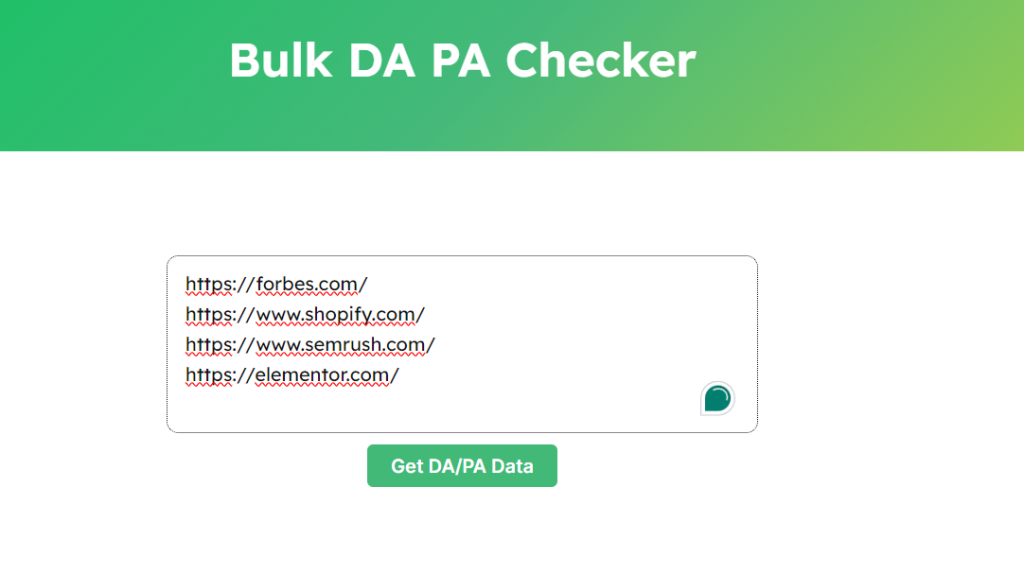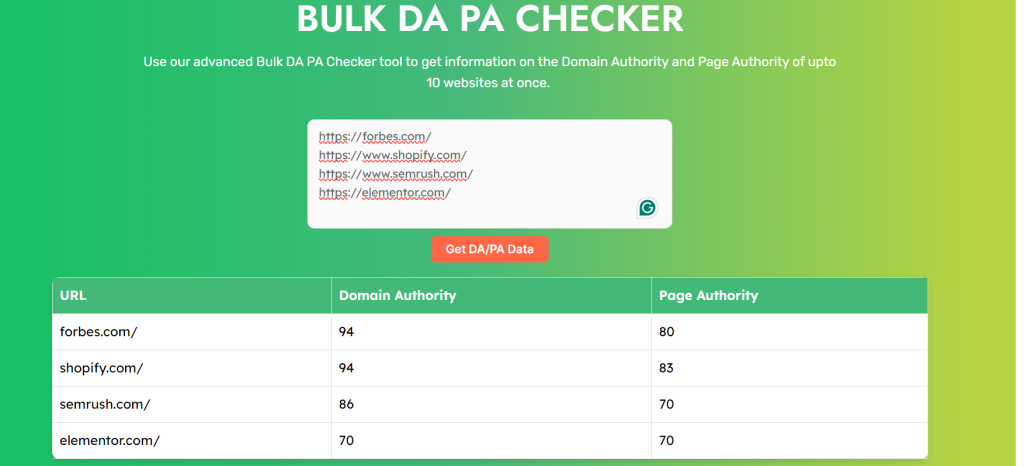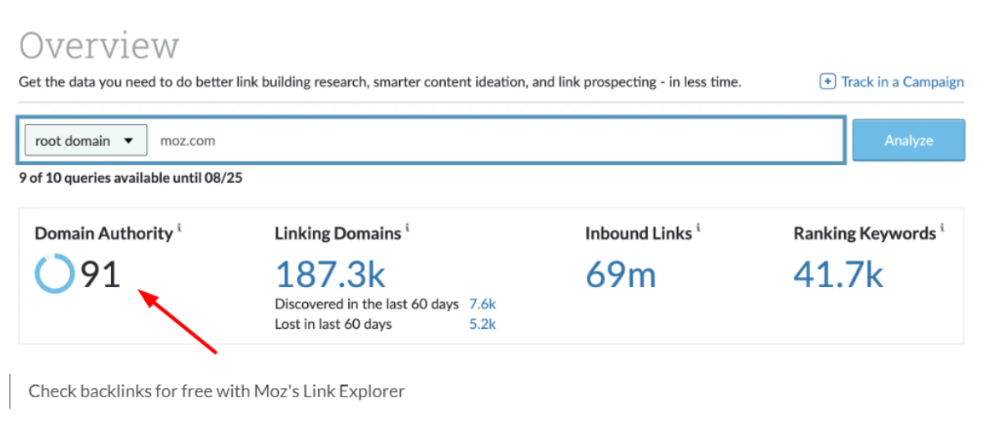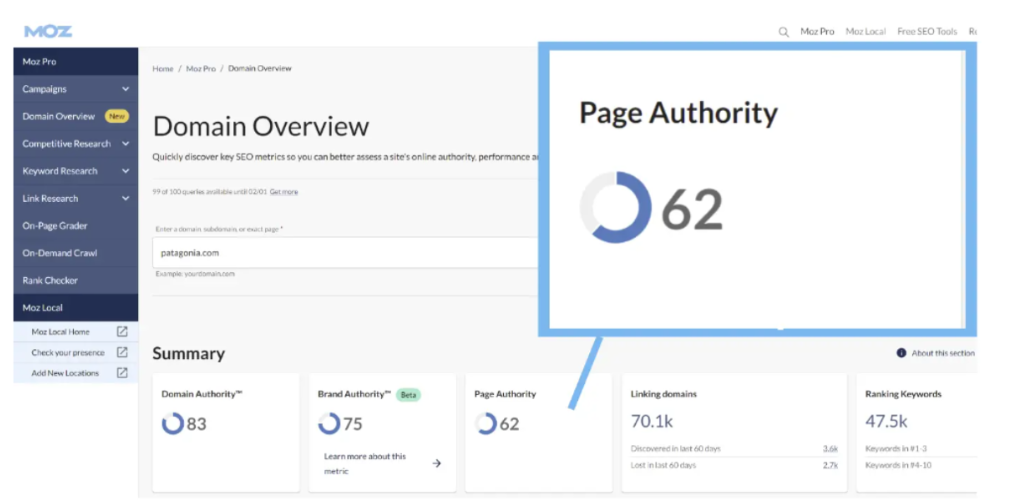In the competitive world of search engine optimization (SEO), understanding your website’s strength and potential to rank well is crucial.
Knowing your site’s strengths and potential to rank well in the SERPs is crucial in the competitive SEO industry.
This is where our tool, DA PA Checker, comes into play. Our DA PA Checker is a powerful and user-friendly tool designed to help webmasters, digital marketers, and SEO professionals gauge the authority of their websites and individual pages.
The DA PA Checker provides quick and accurate measurements of Domain Authority (DA) and Page Authority (PA), two key metrics developed by Moz to predict a website’s or page’s ability to rank in search engine results. By using our tool, you can gain valuable insights into your site’s performance, compare it with competitors, and develop strategies to improve your online presence.
How To Use Our Bulk DA PA Checker?
To help you check any website’s DA and PA, we have created our own Bulk DA PA Checker tool and here’s how you can use it.
Step #1: Copy & Paste the URLs of the domains on the box to check their DA and PA and hit the “Get DA/PA Data” button.

Step #2: You will be able to see the DA/PA of all the websites you checked.

Note – At once, you can only check the DA/PA of 10 websites.
What are DA (Domain Authority) and PA (Page Authority)?
Before diving deeper into the functionality and benefits of our DA PA Checker, let’s first understand what Domain Authority and Page Authority actually mean.
Domain Authority
Domain Authority is a search engine ranking score developed by Moz that predicts how likely a website is to rank in search engine result pages (SERPs). This score ranges from 1 to 100, with higher scores indicating a greater likelihood of ranking well.

DA takes into account numerous factors, including the number and quality of links pointing to your website, the age of your domain, and your site’s overall SEO health. It’s important to note that DA is a comparative metric, meaning it’s most useful when used to compare your site’s authority against that of your competitors.
For example, if your website has a DA of 40 and your competitor’s site has a DA of 30, it suggests that your site may have a better chance of ranking higher in search results, all other factors being equal. However, DA isn’t an absolute measure of your site’s quality or its guaranteed position in search rankings.
Page Authority
While Domain Authority looks at the strength of an entire website, Page Authority focuses on the ranking potential of individual pages. Like DA, PA is scored on a 100-point scale, where higher scores correspond to a greater ability to rank.

PA considers many of the same factors as DA but applies them at the page level. This includes the number and quality of links pointing to the specific page, the page’s content quality, and its alignment with search intent.
For instance, if you have a product page with a PA of 50, it suggests that this particular page has a decent chance of ranking well for relevant keywords. However, it’s crucial to remember that PA, like DA, is a predictive score and not a direct ranking factor used by search engines.
Why do DA and PA matter for your website?
Understanding your website’s Domain Authority and Page Authority can provide valuable insights into your SEO efforts and help guide your strategy. Here’s why these metrics matter:
- Competitive Analysis: DA and PA allow you to compare your site and pages against those of your competitors. This comparison can help you identify areas where you need to improve to outrank your competition.
- Link-Building Strategy: By knowing your DA and PA, you can target link-building opportunities more effectively. You might focus on gaining links from sites with higher DA than yours to boost your own authority.
- Content Strategy: PA can help you identify which pages on your site are the strongest. You can then use these high PA pages to link to and boost other important pages on your site.
- SEO Progress Tracking: While rankings can fluctuate daily, DA and PA tend to change more slowly. These metrics can provide a more stable indicator of your SEO progress over time.
- Identifying Improvement Areas: If you notice that certain pages have low PA compared to others on your site, it might indicate areas where you need to focus your SEO efforts.
- Prioritizing SEO Efforts: In large websites, it can be challenging to decide where to focus your SEO efforts. DA and PA can help you prioritize which sections or pages to work on first.
Remember that while DA and PA are useful predictive metrics, they are not direct ranking factors used by Google or other search engines. Google has repeatedly stated that they don’t use domain authority or any similar metric in their ranking algorithms. Instead, DA and PA should be seen as tools to help you understand and improve your overall SEO strategy rather than as direct paths to higher rankings.
How is Domain Authority Calculated?
Domain Authority is calculated using a complex algorithm that takes into account over 40 different factors. While the exact formula is proprietary to Moz, we know that it considers several key elements:
- Link Profile: The number and quality of inbound links to your domain play a significant role. Links from high-authority sites carry more weight.
- Root Domains: The number of unique root domains linking to your site is important. Having links from a diverse range of quality websites is better than having many links from a few sites.
- Domain Age: Older domains tend to have higher authority, as they’ve had more time to establish themselves and gain links.
- On-Page SEO: While DA is primarily link-based, good on-page SEO can indirectly influence it by making your site more likely to attract quality links.
- Content Quality: High-quality, relevant content is more likely to attract links, indirectly boosting DA.
- Site Structure: A well-organized site with a logical structure can positively impact DA.
DA is calculated on a logarithmic scale. This means it’s much easier to grow your score from 20 to 30 than from 70 to 80. Also, DA is a relative metric, so your score can change even if you haven’t made any changes to your site based on how the overall link profile of the internet evolves.
How to Increase your Website’s Domain Authority?
Improving your Domain Authority takes time and effort, but it can significantly boost your site’s overall SEO performance. Here are some strategies to increase your DA:
- Producing valuable, original content that addresses your audience’s needs can naturally attract backlinks and improve your DA.
- Focus on earning links from reputable, high-authority websites in your niche. Quality is more important than quantity.
- A strong internal linking structure helps distribute link equity throughout your site and can boost your overall DA.
- Use tools to identify and remove or disavow low-quality or spammy backlinks that might be hurting your DA.
- A faster, more user-friendly site is more likely to attract and retain visitors, potentially leading to more natural backlinks.
- With mobile-first indexing, having a mobile-friendly site can indirectly boost your DA by making your site more link-worthy.
- Writing high-quality guest posts for reputable sites in your industry can help you earn valuable backlinks and increase your DA.
DA doesn’t increase overnight. It takes time for search engines to recognize and reward your SEO efforts. So, be patient and keep following this checklist to improve slowly but continuously.
What is a Good Page Authority Score?
Determining what constitutes a “good” Page Authority score depends largely on your specific niche and competition. However, here’s a general guideline:
- PA 1-20: Low authority
- PA 21-40: Average authority
- PA 41-60: Above average authority
- PA 61-80: High authority
- PA 81-100: Very high authority
Remember, PA is a comparative metric. A “good” PA score is one that’s higher than your direct competitors for specific keywords or topics. For instance, if you’re in a highly competitive niche where most pages have a PA of 50-60, then a PA of 65 would be considered good. However, in a less competitive niche, a PA of 40 might be sufficient to outrank your competitors.
How to improve Page Authority?
To improve Page Authority, focus on creating high-quality content and optimizing on-page SEO. Earn quality backlinks from reputable sites and ensure your page loads quickly. Enhance user experience, use internal linking effectively, and optimize for mobile. Regularly update your content and promote it on social media to increase visibility and potential for earning links.
Domain Authority vs Page Authority
While DA and PA are related concepts, they serve different purposes and have distinct characteristics. Here’s a comparison table to help you understand the key differences:
| Aspect | Domain Authority (DA) | Page Authority (PA) |
| Scope | Entire website or subdomain | Individual web page |
| Scale | 1-100 | 1-100 |
| Primary Use | Comparing overall site strength | Assessing individual page ranking potential |
| Factors Considered | Domain-wide metrics (overall link profile, domain age, etc.) | Page-specific metrics (page-level links, on-page SEO, etc.) |
| Fluctuation | Generally more stable | Can change more rapidly |
| New Site/Page | New domains start with low DA | New pages on established domains can inherit some authority |
| Influence of Internal Pages | Affected by the collective strength of all pages | Primarily affected by its own characteristics and direct links |
| Link Building Impact | Broader impact across the entire site | More direct impact on the specific page |
| Content Updates | Less directly impacted by individual page updates | Can be more quickly influenced by on-page changes |
| Use in SEO Strategy | Overall site improvement and competitor analysis | Page-level optimization and prioritization |
Conclusion: Check your website’s Domain and Page Authority with our DA PA Checker
The DA PA Checker is an invaluable tool for anyone serious about improving their website’s search engine performance. By providing quick and accurate measurements of Domain Authority and Page Authority, it offers insights that can guide your SEO strategy and help you make data-driven decisions.
Remember, while DA and PA are powerful predictive metrics, they are not direct ranking factors used by search engines. Instead, they should be viewed as indicators of your site’s overall SEO health and potential to rank well. Use them as part of your SEO strategy, which includes creating high-quality content, building a strong and natural link profile, and providing an excellent user experience.
Improving your DA and PA takes time and consistent effort. Focus on creating value for your users, earning quality backlinks, and following SEO best practices. Regularly check your progress using our DA PA Checker, but don’t obsess over small fluctuations. Instead, look for long-term trends and use the insights gained to continually refine your SEO strategy.